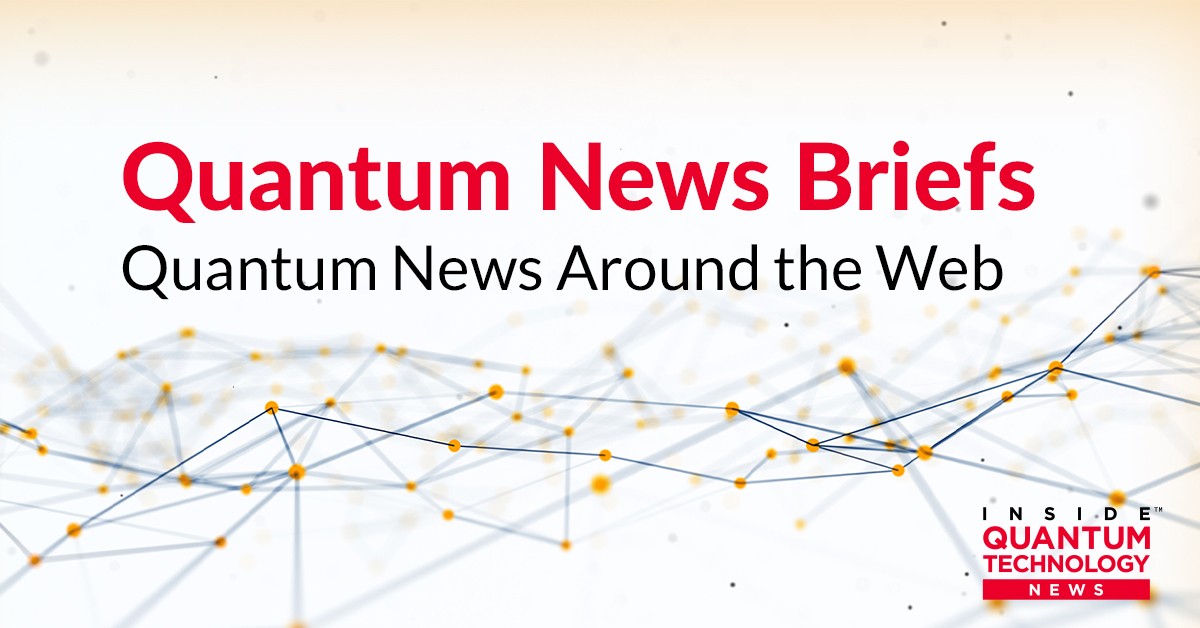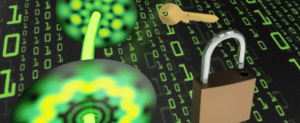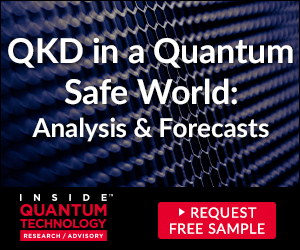Quantum News Briefs August 1: Entangled particles as “secret keys” for quantum cryptography followed QuSecure CEO’s warnings about “Q-Day”, Irish-American team laying foundation for quantum internet

Quantum News Briefs today opens with news from an international team of researchers who used entangled particles as “secret keys” for quantum cryptography followed by QuSecure CEO’s article warnings about “Q-Day”. Announcements of an Irish-American team laying foundation for quantum internet and successful autonomous, quantum-secure military drone trial are also covered.
Researchers Use Entangled Particles as “Secret Keys” for Quantum Cryptography
 Scientists have uncovered a new type of quantum cryptography that utilizes one of the same laws of physics used in building quantum computers: quantum entanglement.
Scientists have uncovered a new type of quantum cryptography that utilizes one of the same laws of physics used in building quantum computers: quantum entanglement.
An international research team, consisting of theoretical and applied physicists and computer scientists, has experimentally implemented a “bug-proof” type of quantum cryptography using quantum entanglement that could pave the way for secure communication between real-world devices.
This research was carried out at the University of Oxford with contributions from the University of Geneva, the French Alternative Energies and Atomic Energy Commission (CEA), EPFL, and ETH Zurich. View the scientific paper published in Nature at this link.
The researchers “demonstrated a complete quantum key distribution (QKD) protocol immune to the vulnerabilities and defects of physical devices that plague current quantum protocols.” This QKD protocol uses entangled particles as “secret keys” that will allow for the detection of third-party security breaches and render devices unhackable.
*****
Q-Day: The Problem with Legacy Public Key Encryption
 It’s not hard to imagine the impacts of Q-Day. Attackers will easily get access to data, control over systems, or both. At the level of the general public, a loss of encryption could lead to huge crime waves that involve bank account takeovers and theft of personal information. Hackers could disrupt daily life by commandeering Internet of Things (IoT) devices and connected vehicles. Dave Krauthamer, CEO, QuSecure, wrote recently in HelpNetSecurity about the looming threat. Quantum News Briefs summarizes here.
It’s not hard to imagine the impacts of Q-Day. Attackers will easily get access to data, control over systems, or both. At the level of the general public, a loss of encryption could lead to huge crime waves that involve bank account takeovers and theft of personal information. Hackers could disrupt daily life by commandeering Internet of Things (IoT) devices and connected vehicles. Dave Krauthamer, CEO, QuSecure, wrote recently in HelpNetSecurity about the looming threat. Quantum News Briefs summarizes here.
Malicious actors could destroy critical infrastructure, causing electrical blackouts and a breakdown of emergency services and healthcare, just to name a few potential outcomes. At the level of national security, Q-Day would be an unmitigated disaster. Intelligence and military capabilities rely on secrecy, which would no longer exist.
These dire Q-Day predictions are educated guesses because there is not yet a quantum computer with enough power to crack current encryption. Yet, with tens of billions of dollars being spent on quantum computer research and development in the US, China, and other countries, it’s likely that Q-Day – this moment of radical vulnerability – will arrive within the next 10 years.
A lot of things could go wrong with quantum computing development, which may push Q-Day off for a few more years. Things could go right, too, which would bring it sooner.
A number of countermeasures have become available to help mitigate the threat: post-quantum cybersecurity (PQC) technologies, e.g., post-quantum encryption standards and various hardware- and software-based methods of defending data against quantum attackers.
The U.S. Government is taking the issue seriously. The development of quantum-resilient algorithms is under way.
Q-Day is coming. It will bring massive disruption to society and our national security is at risk if those in charge of protecting our data do not take action. The updgrade to PQC from legacy public key cryptography should start right away.
*****
US-Irish Partnership Gets €3m to Lay Foundations of Quantum Internet
 A partnership between four research centres in the US and the island of Ireland has received €3m in funding to accelerate the creation of a quantum internet. Funding for the project came from the US-Ireland R&D Partnership, which involves funding agencies across the US, Republic of Ireland and Northern Ireland. Leigh McGowran reported on project for Silicon Republic & summarized here.
A partnership between four research centres in the US and the island of Ireland has received €3m in funding to accelerate the creation of a quantum internet. Funding for the project came from the US-Ireland R&D Partnership, which involves funding agencies across the US, Republic of Ireland and Northern Ireland. Leigh McGowran reported on project for Silicon Republic & summarized here.
The CoQREATE (Convergent Quantum Research Alliance in Telecommunications) project includes Connect, the Science Foundation Ireland (SFI) research centre for future networks and communications based in Trinity College Dublin, as well as SFI photonics centre IPIC.
The investment will create at least 10 research positions to investigate technologies that will form the foundation of a quantum internet.
As well as Connect and IPIC, the CoQREATE project includes the US Center for Quantum Networks and the quantum technology group at Queen’s University Belfast.
Connect director Prof Dan Kilper said the joint project enables researchers to shape how quantum and classical networks will come together.
*****
Quantum-Secure Military Drone Demo a Milestone in Security of Crewed & Uncrewed Applications

Quantum encryption specialist Arqit and autonomous system supplier Blue Bear have demonstrated quantum-resistant data security on autonomous drones in a battlespace environment. Quantum News Briefs summarizes the coverage in IOTWorld.
Blue Bear simulated and flew mock information surveillance and reconnaissance missions on a drone using task and target data encrypted using Arqit’s technology.
During the mission, image data of potential targets was encrypted and relayed securely using Arqit’s quantum-safe communications tunnel.It used what is known as rotating symmetric keys, meaning the keys used to encrypt and decrypt messages are changed frequently, making it harder for adversaries to intercept data. This is believed to be the first time this was demonstrated on small drones.
The communication endpoints were also actively authorized to ensure secure communication.
“The promise of multi-domain integration can only be met with stronger, simpler encryption enabled using a lightweight software protocol for small drones,” said David Williams, Arqit founder, chairman and CEO.
*****
Senators Hassan and Portman Introduce Bipartisan Bill to Strengthen National Security by Preparing for Quantum Cybersecurity Risks

U.S. Senators Maggie Hassan (D-NH) and Rob Portman (R-OH) introduced a bipartisan bill on July 21 to strengthen national security by preparing the federal government’s defenses against quantum-computing-enabled data breaches. As quantum computers, including those being developed by our adversaries, continue to get more powerful and more widely available, federal agencies must proactively work to ensure that federal cybersecurity protections remain up to date. Quantum News Briefs shares a summary of the announcement here.
The Quantum Computing Cybersecurity Preparedness Act would:
- Require the Office of Management and Budget (OMB) to prioritize the acquisition and migration of federal agencies’ information technology to post-quantum cryptography;
- Instruct OMB to create guidance for federal agencies to assess critical systems one year after the National Institute of Standards and Technology (NIST) issues planned post-quantum cryptography standards;
- Direct OMB to send an annual report to Congress that includes a strategy on how to address post-quantum cryptography risks, the funding that might be necessary, and an analysis on whole-of-government coordination and migration to post-quantum cryptography standards and information technology.
In addition, Senator Hassan previously joined the New Hampshire congressional delegation in announcing $2.76 million in federal funding for Dartmouth College to support its quantum genome mapping project.
*****
Sandra K. Helsel, Ph.D. has been researching and reporting on frontier technologies since 1990. She has her Ph.D. from the University of Arizona.
























